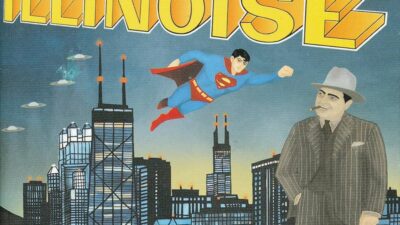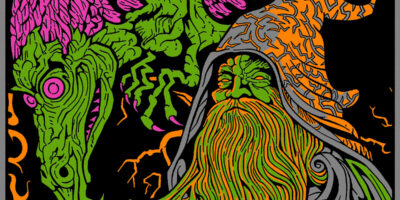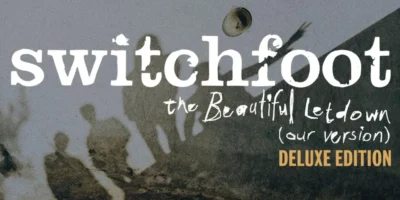Genre: Indie Pop, Indietronica
Favorite Tracks: “Video Game,” “Tell Me You Love Me,” “Die Happy,” “Ativan,” “Death Star,” “The Ascension”
When Sufjan Stevens dropped “America,” the first single from THE ASCENSION, I didn’t know what to think. My first impressions were that it seemed to blend the electronic instrumentation explored on THE AGE OF ADZ with the darker, melancholy moods of CARRIE AND LOWELL. It was long, and not long as in “Wow, this is progressive and there’s a lot going on,” but long as in “Damn, this song is long.”
Then we got “Video Game,” a short, moody, and delightfully catchy synthpop track. The two songs were… different. I began to wonder (not worry) about how these styles would meld together on the album as a whole. As we waited for the album to drop, I was lurking in discussion with other music writers who were voicing concerns with the direction of the new songs. A thing that stuck with me from those conversations was someone stating they were nervous about the severe sense of whiplash they would feel as Stevens abandoned the delicate, acoustic intimacy of 2015’s CARRIE AND LOWELL for an almost exclusively electronic palette. This was confusing; it’s not the first time Stevens has made a shift in sound, and it can be easily argued that the jump from ILLINOIS to AGE OF ADZ was far more dramatic. Just look at the projects he’s been involved in since his last full length in 2015; a synth-heavy thematic exploration of the solar system, soundtracks for film and ballet, and a collaborative album with his step-father that was influenced by Enya… Stevens’ music has never stayed in one place for too long, and those who set up camp in the shade of one album’s stylings are sure to find themselves stranded in the sun sooner or later .
THE ASCENSION is a monster of an album, clocking in at 80 minutes spread across 15 tracks. Following the stretch of aforementioned collaborative releases, Stevens handles most of the instrumentation and production here on his own. Most of the songs utilize a limited range of drum and synth sounds, layering in loop elements and choir vocal arrangements. The album opens with “Make Me An Offer I Cannot Refuse,” a slow burner that finds Stevens’ lead vocal line weaving in between twinkling synths, glitchy percussion, and a maze of his own background vocals looped and delayed. One of the immediately welcomed elements of the record after the hushed somber moods of CARRIE AND LOWELL is the sense of ebb and flow. “Tell Me You Love Me” starts off as a sparse ballad with a soft keyboard line over a simple beat that finds Stevens hopeless and desperate for affirmation (“My love, I’ve lost my faith in everything / tell me you love me anyway”). As the song progresses, it builds into a powerful, explosive celebration of booming bass and a choir-like response to the narrator’s pleadings for love (“I’m gonna love you anyway”). “Die Happy” follows a similar soft-to-loud formula, though the build here comes in the form of a wall of noise that drops into an absolutely infectious dance groove.
The album contains its fair share of more experimental tracks. The frantic beat and eerie synths that form the foundation of “Ativan” perfectly mirror the kind of anxiety attack that would have one reaching for the prescription bottle, eventually giving way to a cacophony of static and whirring motor sounds. “Ursa Major” also incorporates unique samples and percussion, and features one of the more emotional vocal deliveries on the record as Stevens passionately asserts “I wanna love you / And I’m definitely gonna do it.” The musical direction of these songs seem to follow in some of the footsteps set down on the APORIA album Stevens released earlier this year. One of the highlights on the album, “Death Star,” is a pseudo-industrial goth funeral march that features some of his darkest lyrics to date (“Trash talk, violate it / vandalize what you create / It’s your own damn head on the plate”) repeated over a distorted beat that will have you stomping across the dancefloor until doomsday comes.
Lyrically, THE ASCENSION reads like a pros and cons list kept over the past five years; it maneuvers through love lost and reclaimed, faith abandoned and desperately sought, fingers pointed at the crowd, but also at the mirror. While there are numerous lines that, if isolated, can make this sound like Stevens’ most pessimistic album to date (“Now that all of my dreams have been confiscated… Now that it’s too late to have died a young man”), he immediately resolves the thoughts with messages of hope or strength (“Well, I’m just glad I’m still alive / For what hasn’t killed me will make me stronger”). This thread of emotional first reactions to outside stimuli being subjected to personal reflection runs throughout the entire record, and is perfectly summed up in the stunningly beautiful title track. It is one of the more musically simplistic songs, which gives the listener an opportunity to absorb the thoughtful ruminations upon the issues presented up until this point on the record, helping Stevens reach the conclusion that his frustrations were brought on by “asking far too much of those around me” and that ultimately all one can do is answer for themselves. For an album of THE ASCENSION’s magnitude, it’s an impressively satisfying ending—except it’s not the end. Which brings us to the album’s one glaring flaw, the lead single “America.”
The song is just as confusing as it was when it first dropped earlier in the summer. One could argue that it is the most reminiscent of a “classic”-sounding Sufjan Stevens track, whatever that means. Thematically, the dissatisfaction of the state of the nation works with issues tackled in the other song, but the message of condemnation is completely at odds and contradictory with the absolution that came moments before in the title track. Moving it around in the tracklist probably wouldn’t have made it work any better. At a whopping 12-and-a-half minutes, it is the only track in the 80-minute duration of the record that feels like it is dragging. It is not necessarily a bad song, but it would have worked much better if it had been released as a standalone single.
With THE ASCENSION, Sufjan Stevens continues to demonstrate why he is a powerful force in the indie sphere. His continuous output of content that easily shifts between styles is reminiscent of chameleon-like tendencies of the late David Bowie. The changes aren’t always what we expect, or want necessarily, but if Sufjan wants to try something, he’s going to try it, and chances are it’s going to be pretty good.















Comments